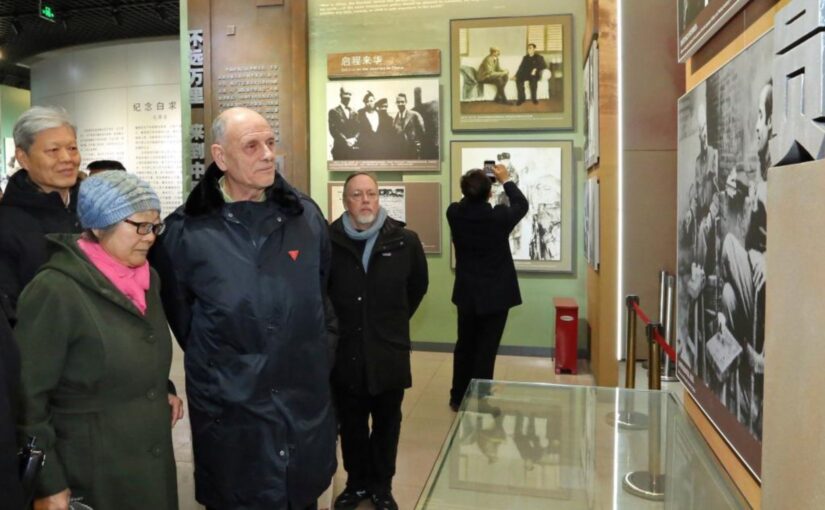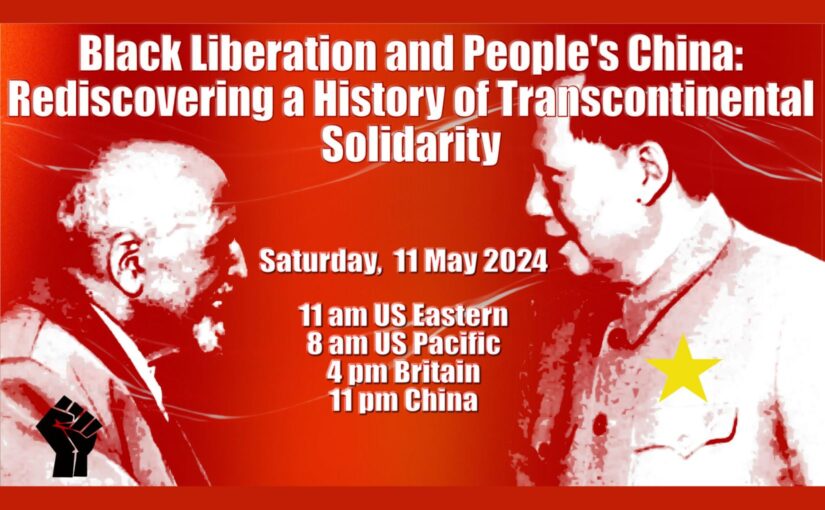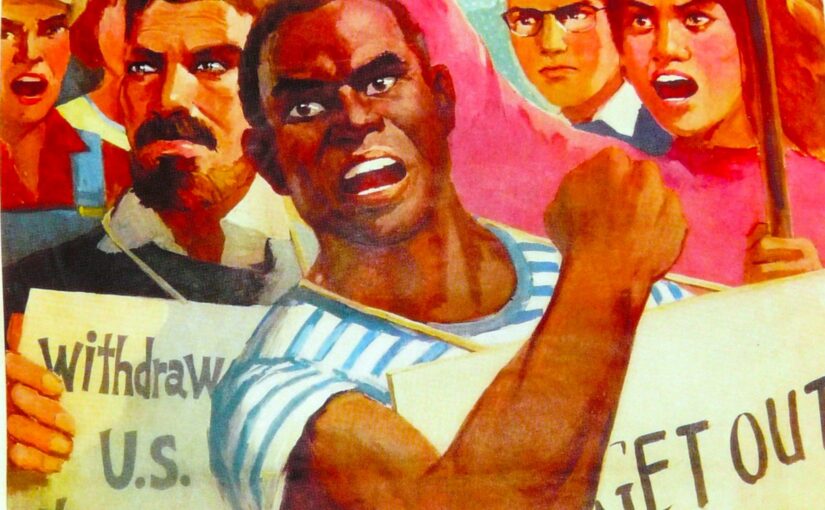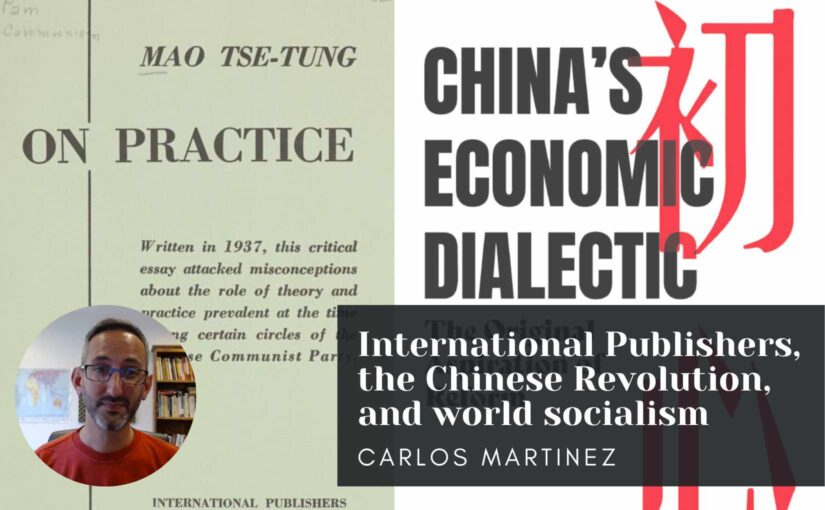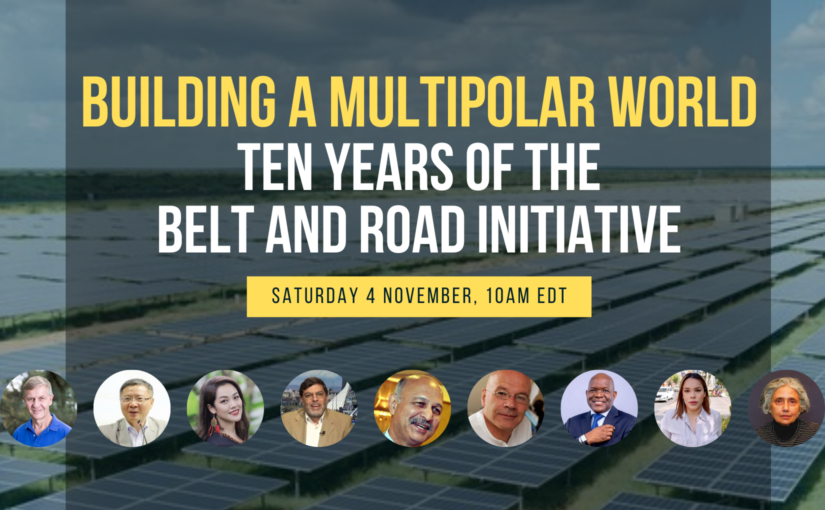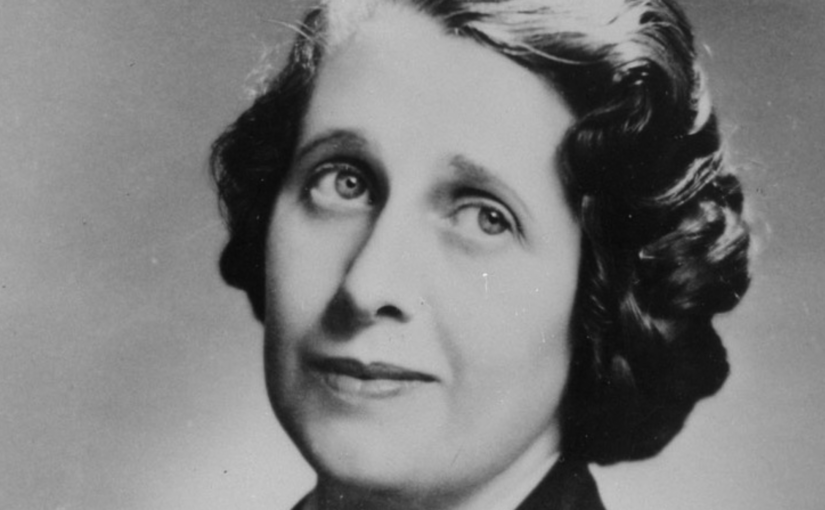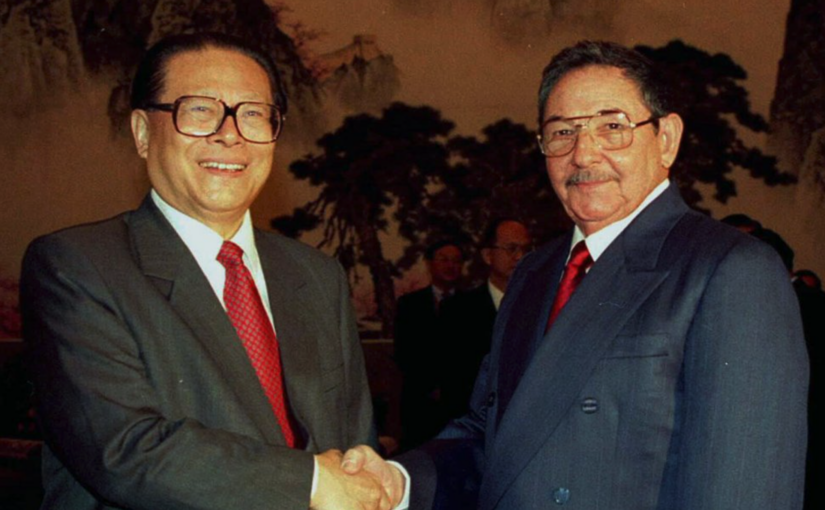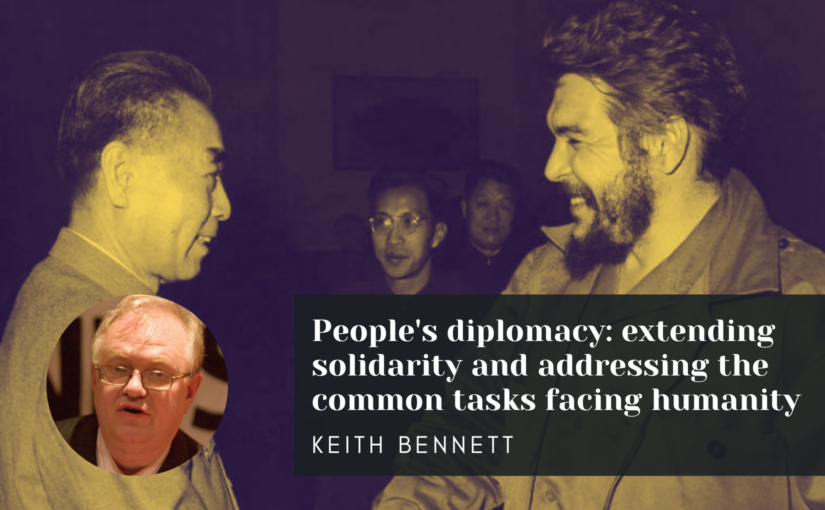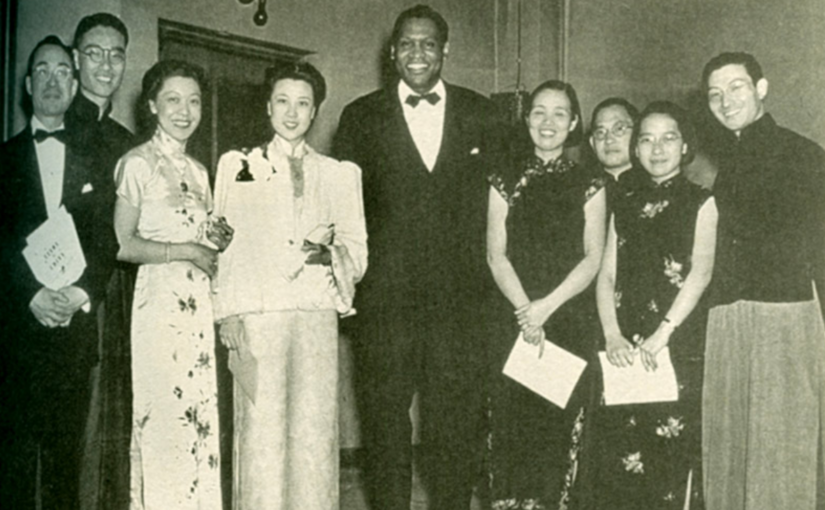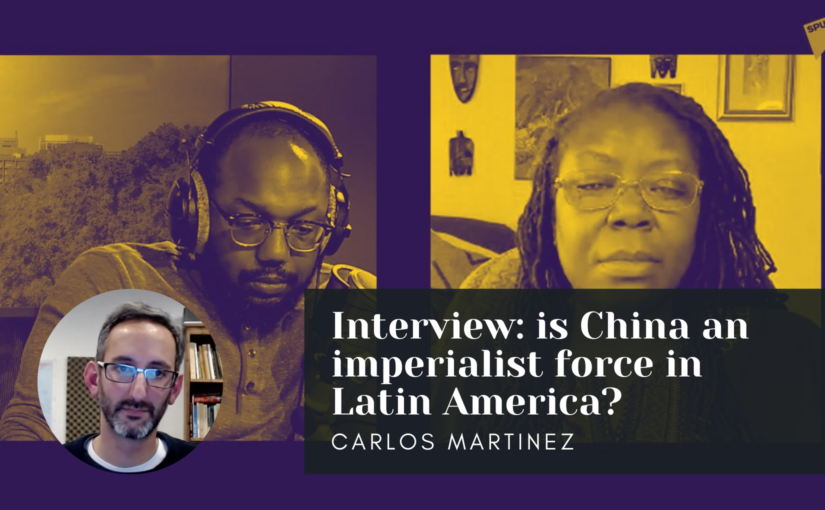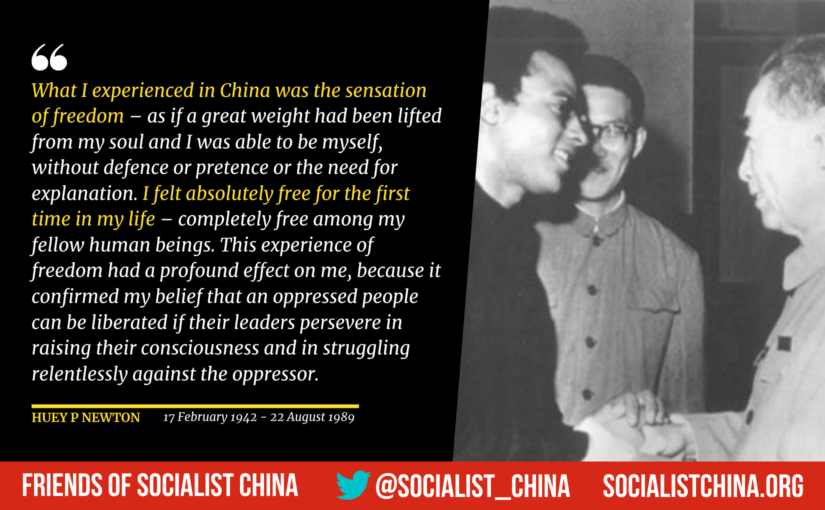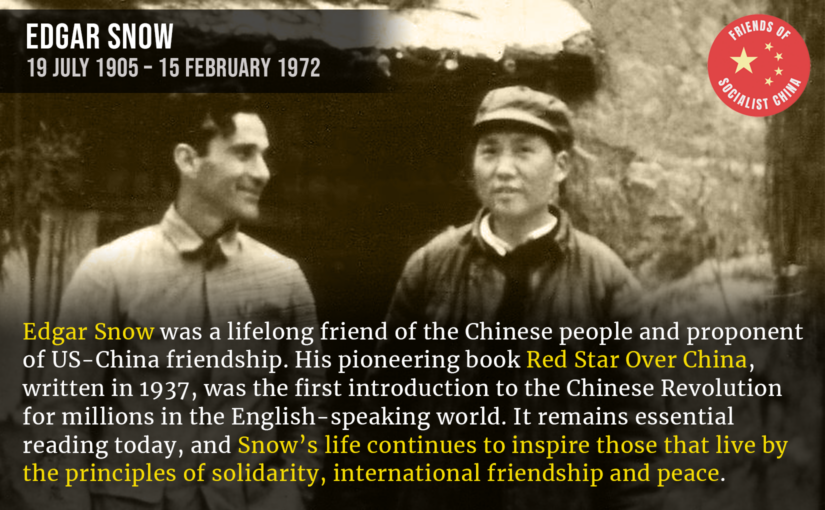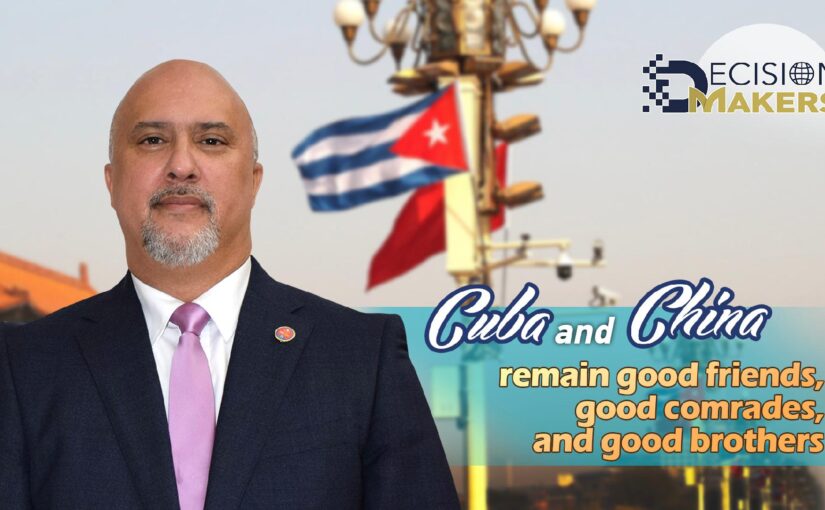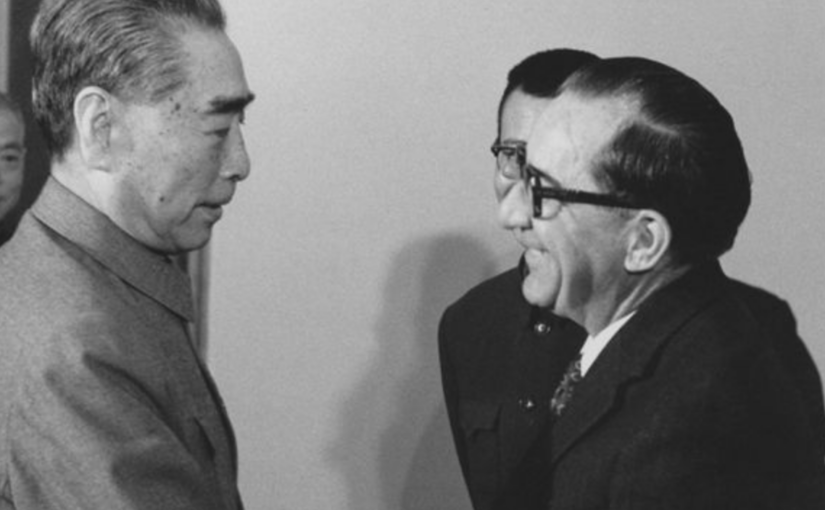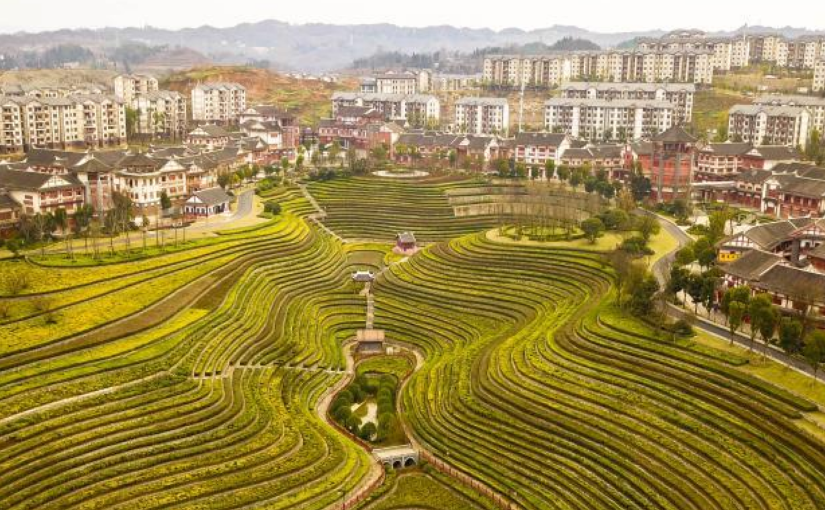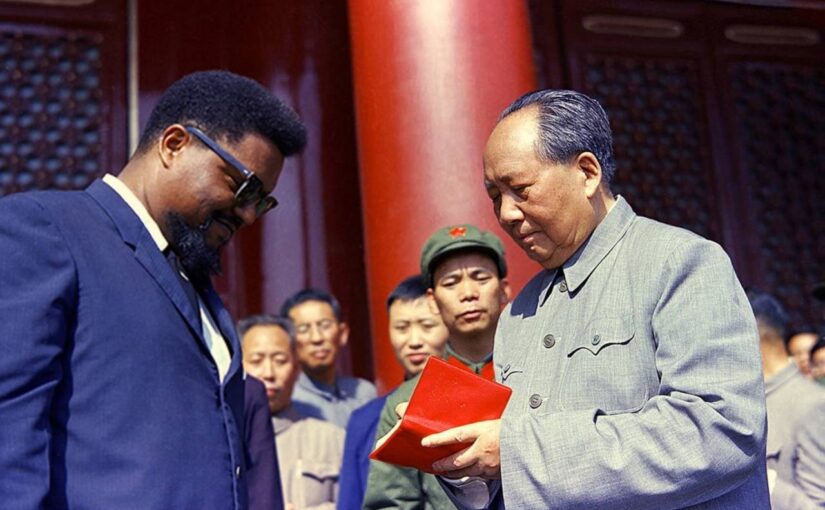As a veteran statesman, late Chinese leader Jiang Zemin has been widely mourned not only in his own country, but also throughout the world. Naturally, his loss has been particularly felt in fraternal socialist and other anti-imperialist and progressive countries, something that is reflected in the four brief reports which we reproduce below from the Xinhua News Agency.
Comrade Thongloun Sisoulith, General Secretary of the Lao People’s Revolutionary Party (LPRP) Central Committee and Lao President, described the former Chinese president as a close friend to the LPRP and the Lao people and said he had played a significant role in guiding the development of Laos-China relations. Comrade Jiang Zemin visited Laos in 2000.
According to Miguel Diaz-Canel Bermudez, First Secretary of the Central Committee of the Communist Party of Cuba and Cuban President, Jiang was an outstanding statesman and communist leader, as well as a close friend of the Cuban Revolution. Jiang Zemin visited Cuba in 1993 and 2001. He was the only head of state to visit the socialist island during the worst days of the ‘special period’. Cuba declared a period of official mourning for Jiang on December 1st.
Belarusian President Alexander Lukashenko said Jiang had led the Chinese people to achieve prosperity and strength. Jiang Zemin visited Belarus in 2001.
Palestinian President Mahmoud Abbas said he and the Palestinian people will always remember such an outstanding leader who was a supporter of the Palestinian people and their cause and legal rights, as well as a promoter of Palestine-China relations. Jiang Zemin visited Palestine in 2000.
Nicaraguan President Daniel Ortega said the spiritual and cultural legacy left by Jiang is guiding and will continue to guide the Chinese people towards greater development.
Venezuelan President Nicolas Maduro said Jiang had forged a profound friendship with the people of Latin America and Venezuela. Jiang Zemin visited Venezuela in 2001.
According to Comrade Kim Jong Un, leader of the Democratic People’s Republic of Korea (DPRK), Jiang devoted all his life to the development and growth of the Communist Party of China and the country, as well as to the happiness of the Chinese people. Kim added that Jiang extended sincere support for and solidarity with the socialist cause of the DPRK people, and actively committed himself to consolidating and developing the traditional friendship between the DPRK and China. Jiang visited the DPRK in 2001 and also hosted the final overseas visit of the DPRK’s founding leader Kim Il Sung.
Cambodian King Norodom Sihamoni said Jiang was an outstanding representative of the Chinese people and a great friend of the Kingdom of Cambodia and the Cambodian people and made great contributions to the restoration of peace and stability in Cambodia, to the country’s national unity as well as to closer brotherhood, stronger solidarity and deeper cooperation between Cambodia and China. Jiang Zemin visited Cambodia in 2000 and the Cambodian royal family, which has always stood on the side of anti-imperialist independence, has enjoyed an extraordinary friendship with socialist China ever since the present king’s father Samdech Norodom Sihanouk first met with Premier Zhou Enlai at the 1955 Bandung Afro-Asian Conference.
Brazilian President-elect Luiz Inacio Lula da Silva said China, under the leadership of Jiang, had made remarkable achievements in development and lifting people out of poverty.
General Secretary of the Communist Party of Vietnam Central Committee Nguyen Phu Trong and other top Vietnamese leaders sad that Jiang was an outstanding leader of the Communist Party of China (CPC) and the country, who had made distinguished contributions to the cause of building socialism with Chinese characteristics.
The principles of “long-term stability, future orientation, good-neighborly friendship and all-round cooperation” and the spirit of “good neighbor, good friend, good comrade and good partner” were developed by Jiang together with his Vietnamese counterparts. Jiang Zemin visited Vietnam in 2002.
Nepali President Bidya Devi Bhandari, a veteran leader of Nepal’s communist movement, said that her country will always remember Jiang’s contribution to fostering and consolidating the good-neighborly relations between Nepal and China. Jiang visited Nepal in 1996.
Eritrean President Isaias Afwerki observed that Jiang was full of foresight and wisdom and made great contributions to China’s rapid economic growth and the remarkable improvement of its international status in the past decades.
Namibian President Hage Geingob said he appreciated Jiang’s indelible contributions to Namibia’s independence and soci-economic development.
World leaders mourn passing of former Chinese leader Jiang Zemin
Xinhua, 2 December 2022
Leaders of many countries and international organizations have expressed their deep condolences by phone, letter and other means to Chinese President Xi Jinping over the passing of former Chinese leader Jiang Zemin.
Underscoring Jiang’s important dedication to the economic and social development of contemporary China and the country’s rise in international standing, Russian President Vladimir Putin said Jiang was an old friend of Russia, who had made great contributions to elevating the Russia-China relationship to a strategic partnership of coordination.
He will always remember such a statesman with lofty prestige and tremendous personal charisma, Putin said, expressing his sincere sympathy to Jiang’s family and all the friendly Chinese people.
Jiang had made important contributions to the socialist cause with Chinese characteristics, said Thongloun Sisoulith, general secretary of the Lao People’s Revolutionary Party (LPRP) Central Committee and Lao president.
The former Chinese president, a close friend to the LPRP and the Lao people, had played a significant role in guiding the development of Laos-China relations, Thongloun added.
Jiang was an outstanding statesman and communist leader, as well as a close friend of the Cuban Revolution, said Miguel Diaz-Canel Bermudez, first secretary of the Central Committee of the Communist Party of Cuba and Cuban president, adding that Cuba expressed its deepest condolences to the Communist Party of China (CPC), the Chinese government and people.
Jiang had made considerable contributions to improving the living standard of the Chinese people and leading the drive to grow China into a stable and prosperous economy, said Brunei’s Sultan Haji Hassanal Bolkiah, adding that Brunei highly appreciates Jiang’s efforts in deepening the long-standing ties between the two countries.
Jiang had led China on a period of rapid growth and development through sustained economic reforms, said Singaporean President Halimah Yacob, adding that their thoughts are with the people of China during this moment of grief.
Maldivian President Ibrahim Mohamed Solih said that Jiang had promoted the rapid development of the Chinese economy and society, and strengthened China’s role as an important contributor on the global stage, adding that Jiang will be remembered as a farsighted leader.
Kazakh President Kassym-Jomart Tokayev said Jiang was dedicated to promoting China’s development and prosperity, and enhancing its international influence.
The former Chinese leader had made great contributions to strengthening friendship between Kazakhstan and China, and would be remembered forever by people of the two countries, he added.
Tajik President Emomali Rahmon spoke highly of the great contributions Jiang had made to the development of China and to Tajikistan-China relations, saying that his passing is a major loss.
Belarusian President Alexander Lukashenko said Jiang had led the Chinese people to achieve prosperity and strength. Calling Jiang a founder of Belarus-China relations, he said Jiang had made positive contributions to developing and cementing relations between the two countries.
Palestinian President Mahmoud Abbas said he and the Palestinian people will always remember such an outstanding leader who is a supporter of the Palestinian people and their cause and legal rights, a promoter of Palestine-China relations and an eyewitness to the establishment of the diplomatic relations between Palestine and China.
Tanzanian President Samia Suluhu Hassan extended her deep sympathy to the CPC, the Chinese people and Jiang’s family.
Nicaraguan President Daniel Ortega said the spiritual and cultural legacy left by Jiang is guiding and will continue to guide the Chinese people for greater development.
President Xi, with his unquestionable leadership and rich experience, will surely lead the Chinese people forward to success along the road of socialism with Chinese characteristics, he added.
Venezuelan President Nicolas Maduro said Jiang had forged a profound friendship with the people of Latin America and Venezuela, and the Venezuelan side expressed deep condolences over his passing.
Czech President Milos Zeman said Jiang had achieved a great success in promoting China’s economic reform and his achievements will be recorded in Chinese history, adding that he highly appreciates Jiang’s ability to promote China’s economic development and stability.
Japanese Prime Minister Fumio Kishida said Jiang had promoted China’s reform and opening-up, made contributions to China’s development and played an important role in promoting the development of Japan-China relations.
Singaporean Prime Minister Lee Hsien Loong said Jiang had led China in promoting the reform and opening-up, guided the path for China to integrate into the global economy and play an important role on the world stage, and made important contributions to expanding Singapore-China relations. Singapore will always and deeply remember this respected friend.
Pakistani Prime Minister Shahbaz Sharif said Jiang had made valuable contributions to strengthening Pakistan-China relations and Pakistan will always remember this great friend.
UN Secretary-General Antonio Guterres said that Jiang had firmly advocated China’s international engagement, promoted China’s great economic progress and its successful entry into the World Trade Organization, and led China in hosting the landmark Fourth World Conference on Women. On behalf of the United Nations, he offered sincere condolences to Jiang’s family and to the Chinese government and the Chinese people.
Cambodian Prime Minister Samdech Techo Hun Sen and President of the European Council Charles Michel also mourned the passing of Jiang.
More world leaders mourn passing of former Chinese leader Jiang Zemin
Xinhua, 3 December 2022
Leaders of many countries and international organizations continued to express their deep condolences by phone, letter and other means to Chinese President Xi Jinping over the passing of former Chinese leader Jiang Zemin.
Jiang devoted all his life to the development and growth of the Communist Party of China and the country, as well as to the happiness of the Chinese people, said Kim Jong Un, general secretary of the Workers’ Party of Korea and chairman of the State Affairs Commission of the Democratic People’s Republic of Korea (DPRK).
He put forward the Theory of Three Represents, and made important contributions to the great cause of socialism with Chinese characteristics, said Kim.
Jiang extended sincere support for and solidarity with the socialist cause of the DPRK people, and actively committed himself to consolidating and developing the traditional friendship between the DPRK and China, Kim said, adding that Jiang’s legacy endures.
Jiang was an outstanding representative of the Chinese people and a great friend of the Kingdom of Cambodia and the Cambodian people, and made great contributions to the restoration of peace and stability in Cambodia, to the country’s national unity as well as to closer brotherhood, stronger solidarity and deeper cooperation between Cambodia and China, said Cambodian King Norodom Sihamoni, noting that Jiang will be remembered forever.
Recognizing Jiang as a great leader who had led China to prosperity and development, and a good friend of South Korea and its people, South Korean President Yoon Suk-yeol said on behalf of the government and people of South Korea, he extended deep condolences to the bereaved family and the Chinese people.
Kyrgyzstan speaks highly of Jiang’s historic contributions to China’s national construction and the development of Kyrgyzstan-China relations, said Kyrgyz President Sadyr Zhaparov.
The former Chinese leader made great achievements in promoting China’s economic and social development, and greatly enhanced China’s international prestige, said Turkmen President Serdar Berdimuhamedov, adding that Jiang’s accomplishments will go down in history.
Uzbek President Shavkat Mirziyoyev said Jiang made significant contributions to developing the Uzbekistan-China partnership and promoting bilateral cooperation in politics, trade and economy, humanity and other areas, which the Uzbek side will always remember.
Jiang made outstanding contributions to laying a solid foundation for Azerbaijan-China friendly relations and practical cooperation, Azerbaijani President Ilham Aliyev said, extending the deepest condolences to all Chinese people.
Jiang led China in pushing forward the reform and opening-up and embarking on the path of economic development, showing to the entire world that a country can realize economic development through self-reliance, Nigerian President Muhammadu Buhari said.
His leadership achievements in economy have far-reaching impacts and will always be remembered by the people of the world, Buhari said.
As an outstanding politician, Jiang devoted himself to strengthening the foundation of economic prosperity and safeguarding world peace, said Kenyan President William Ruto, extending sincere sympathy to Jiang’s relatives, friends and the Chinese people.
Senegalese President Macky Sall said he, in deep remembrance of Jiang, paid tribute to the glorious cause he had made, and extended sincere condolences to the friendly Chinese people.
Jiang’s pragmatic quality, innovative spirit, outstanding talents and great foresight will always be remembered by the whole world, said Djibouti President Ismail Omar Guelleh.
Jiang has fulfilled his commitment to China and the Chinese people with concrete actions, Uruguayan President Luis Lacalle Pou said, adding that as a statesman, Jiang’s fine moral character will be a valuable asset to future generations.
Brazilian President-elect Luiz Inacio Lula da Silva said China, under the leadership of Jiang, had made remarkable achievements in development and lifted hundreds of thousands of people out of poverty.
Cambodian Prime Minister Samdech Techo Hun Sen said Jiang was an outstanding Chinese statesman and his remarkable leadership not only inspired the Chinese people, but also won the respect of the international community.
On behalf of the Bangladeshi people and government, Bangladeshi Prime Minister Sheikh Hasina expressed her deepest condolences and heartfelt sympathy and said that the friendship between Bangladesh and China was greatly strengthened during Jiang’s tenure.
Jiang was a great supporter of international cooperation, said Csaba Korosi, president of the 77th session of the UN General Assembly, noting that Jiang led China to success and played a prominent role in the United Nations.
Jiang was an outstanding figure in China’s and even the global political circles, and his death is a big loss to China and its friends around the world, said Moussa Faki Mahamat, chairperson of the African Union (AU) Commission.
Faki, on behalf of the AU Commission, extended sincere sympathy to the Chinese government, the Chinese people and Jiang’s family.
Jiang was an outstanding leader enjoying high prestige, said Zhang Ming, secretary-general of the Shanghai Cooperation Organization (SCO), noting that Jiang was the main founder of the SCO, and made indelible historical contributions to the SCO’s establishment, development and growth.
More world leaders mourn former Chinese leader Jiang Zemin
Xinhua, 4 December 2022
Leaders of many countries and international organizations continued to express their deep condolences by phone, letter and other means to Chinese President Xi Jinping over the passing of former Chinese leader Jiang Zemin.
Jiang was an outstanding leader of the Communist Party of China (CPC) and the country, who had made distinguished contributions to the cause of building socialism with Chinese characteristics, said General Secretary of the Communist Party of Vietnam Central Committee Nguyen Phu Trong, Vietnamese President Nguyen Xuan Phuc, Prime Minister Pham Minh Chinh and National Assembly Chairman Vuong Dinh Hue.
The principles of “long-term stability, future orientation, good-neighborly friendship and all-round cooperation” and the spirit of “good neighbor, good friend, good comrade and good partner” jointly established by Jiang and Vietnamese leaders have charted the course for the two parties and two countries to continuously develop relations and achieve important results, they said.
They believe that under the strong leadership of the CPC Central Committee with Comrade Xi Jinping at its core, the Chinese people will surely make new and greater achievements in building socialism with Chinese characteristics.
Recognizing Jiang as an outstanding leader and far-sighted statesman, Nepali President Bidya Devi Bhandari said the late Chinese leader has played an important role in enhancing China’s international status.
Bhandari added that her country will always remember Jiang’s contribution to fostering and consolidating the good-neighborly relations between Nepal and China.
King Salman bin Abdulaziz Al Saud of Saudi Arabia and the kingdom’s Crown Prince and Prime Minister Mohammed bin Salman Al Saud expressed their deep condolences over the passing of Jiang, and extended sincere sympathies to the bereaved family and the Chinese people.
The late Chinese leader has laid a solid foundation for the vigorous development of China’s economy, said Israeli President Isaac Herzog, adding that the Israeli people will never forget Jiang’s important contribution to promoting the development of Israel-China relations.
President of Seychelles Wavel Ramkalawan said that Jiang successfully led China to achieve rapid economic growth and social transformation, and achieved remarkable achievements.
Jiang had laid a good foundation for today’s friendly and cooperative relations between Africa and China, Ramkalawan added.
Jiang was full of foresight and wisdom, and made great contributions to China’s rapid economic growth and remarkable improvement of its international status in the past decades, said Eritrean President Isaias Afwerki.
Jiang was an outstanding Chinese leader, said Solomon Islands Prime Minister Manasseh Sogavare, adding that the government and the people of Solomon Islands join the Chinese people in mourning the passing of such a great leader.
Jiang made a profound impact on China during his tenure, and his name will always be associated with China’s economic take-off and accession to the World Trade Organization, said German President Frank-Walter Steinmeier, adding that Jiang’s great efforts to promote the development of Germany-China relations will never be forgotten.
Jiang’s contribution to China’s development and reform and opening-up will always be remembered, said Polish President Andrzej Duda.
Those expressing condolences over Jiang’s passing to the bereaved family, the CPC, the Chinese government and the Chinese people also include:
Emir of Kuwait Sheikh Nawaf Al-Ahmad Al-Jaber Al-Sabah, Crown Prince of Kuwait Sheikh Mishal Al-Ahmad Al-Jaber Al-Sabah,
President of Cape Verde Jose Maria Neves,
Cameroonian President Paul Biya,
President of the Central African Republic Faustin-Archange Touadera,
Comorian President Azali Assoumani,
Ethiopian President Sahle-Work Zewde,
President of Guinea-Bissau Umaro Sissoco Embalo,
Mozambican President Filipe Nyusi,
President of Niger Mohamed Bazoum,
Chairman of Sudan’s Sovereign Council Abdel Fattah Al-Burhan,
King of Tonga Tupou VI,
President of the Swiss Confederation Ignazio Cassis,
Finnish President Sauli Niinisto,
Norwegian King Harald V,
Estonian President Alar Karis,
Nepali Prime Minister Sher Bahadur Deuba,
Antigua and Barbuda’s Prime Minister Gaston Browne,
Secretary General of the UN Conference on Trade and Development Rebeca Grynspan,
International Telecommunication Union Secretary-General Zhao Houlin,
President of the Economic Community of West African States Commission Omar Alieu Touray.
More world leaders mourn former Chinese leader Jiang Zemin
Xinhua, 4 December 2022
Leaders of many countries and international organizations continued to express their deep condolences via the phone, letters and other means to Chinese President Xi Jinping over the passing of former Chinese leader Jiang Zemin.
Jiang was not only an internationally renowned Chinese leader, but also deeply respected by the Thai people, said Thailand’s King Maha Vajiralongkorn Phra Vajiraklaochaoyuhua.
The King said Jiang’s state visit to Thailand in 1999 had substantially advanced the development of bilateral relations.
Jiang had made remarkable contributions to promoting China’s development and improving China’s international status, said Morocco’s King Mohammed VI.
Namibian President Hage Geingob said he appreciated Jiang’s indelible contributions to Namibia’s aspirations for independence and socio-economic development.
Jiang’s passing is a loss for the Chinese people and the Communist Party of China, as well as Namibia, Geingob said.
The relationship between China and Brazil was elevated to a strategic partnership when Jiang was Chinese president and Brazil became the first developing country to establish a strategic partnership with China, said Brazilian President Jair Bolsonaro. He extended his sincerest sympathy to the Chinese government and people.
Those expressing condolences over Jiang’s passing to the bereaved family, the Chinese government and the Chinese people also include:
President of the United Arab Emirates (UAE) Sheikh Mohamed bin Zayed Al Nahyan,
Qatari Emir Sheikh Tamim bin Hamad Al Thani,
Sultan of Oman Haitham bin Tarik,
King of Bahrain Hamad bin Isa Al Khalifa,
President of the Presidential Leadership Council of Yemen Rashad Mohammed Al-Alimi,
Malawian President Lazarus Chakwera,
President of Guinea Mamady Doumbouya,
Kiribati President Taneti Maamau,
UAE Vice President and Prime Minister Sheikh Mohammed bin Rashid Al Maktoum,
Qatari Deputy Emir Sheikh Abdullah bin Hamad Al Thani,
Qatari Prime Minister and Minister of Interior Sheikh Khalid bin Khalifa bin Abdulaziz Al Thani,
Lao Prime Minister Phankham Viphavanh,
Mauritian Prime Minister Pravind Jugnauth.

